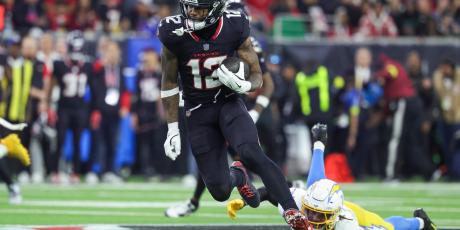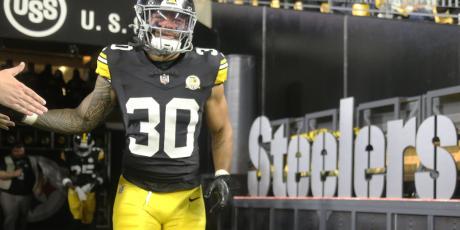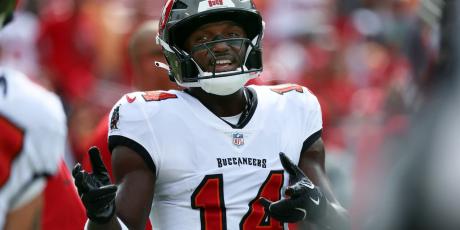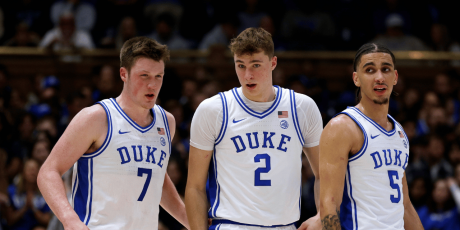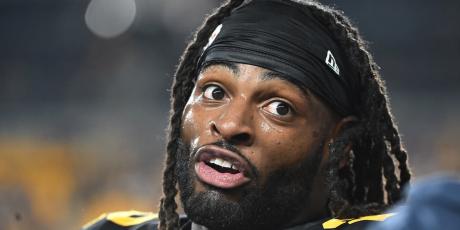Which Teams Invested in Defense in 2022?

Every offseason, once the main part of free agency is over, I compile all the defensive free agent signings to get a quantitative sense of which teams are investing on that side of the ball. One of the best measures of a player's value and ability is the contract that they sign, so I compile the Average Annual Value for each team's free agents in (players the team signed) and free agents out (players signed away by other teams) to come up with a net dollar value for each team.
Also check out: Which Teams Invested in Offensive Line in 2022?
A team with a large positive number means that they brought in significantly more talent than they lost and, if they spent wisely, the team should be better on that side of the ball. Conversely, a team with a large negative number means that they lost significantly more talent than they brought in, and the team should be worse on defense. Caveat: Quality coaching, draft picks, and the development of younger players can offset losses in free agency.
To sum up, here are the five factors that I consider when evaluating a fantasy defense:
-
Previous year’s finish
-
Quality of coaching
-
Strength of schedule
-
Quality of offense
-
Personnel changes from the previous year
This exercise helps to quantify the fifth factor.
Last Season Overview
Here’s what I wrote about the Patriots this time last year:
The Patriots lead the way with a net of $33.5 million spent on defense. Considering this unit was tied for 15th in fantasy scoring in 2020–after finishing first in 2019 and fifth in 2018–and still is led by master schemer Bill Belichick, this is an extremely dangerous defense heading into 2021. Personnel-wise, New England’s premium signings were edge rusher Matt Judon ($13.6 million AAV), safety Jalen Mills ($6.0 million), defensive tackle Davon Godchaux and inside linebacker Kyle Van Noy ($6.0 million). They will also get linebacker Dont’a Hightower back after he elected to sit out 2020 due to COVID-19. The only reservation I have about this unit is the lack of a prolific offense, because a great offense will often put the defense into positive game script (with a lot of pass attempts by the opponent) which creates opportunity for sacks and interceptions, the lifeblood of a great fantasy defense. The offense should be improved after the Pats invested in Hunter Henry, Jonnu Smith, Nelson Agholor and others.
Ultimately, the Patriots’ defense finished second in fantasy scoring to the Cowboys in 2021, so those signings paid major dividends for Belichick and Co. New England spent a net of $33.5 million on defensive free agents (five players net) and added two more defensive players inside the first three rounds of the draft, so they added a net total of seven players on that side of the ball. Belichick successfully turned his defense into one of the best in the league, and the unit’s fantasy scoring increased from 6.7 to 10.0 points per game, an increase of 49%.
Other big-spending teams didn’t fare as well. The Jets ($21.2 million) saw their fantasy scoring decrease by 10% while the Browns ($19.5 million) saw a modest increase of 4%. However, on average, the eight teams that spent more than $7.0 million saw an average increase of 24% in fantasy scoring. This falls in line with historical trends.
The four teams that lost the most talent via free agency–the Saints ($29.8 million), the Ravens ($28.3 million), the Rams ($26.9 million), and the Steelers ($22.5 million)–saw their fantasy scoring decrease by an average of 25%. In this group, only the Saints (-1%) had a modest drop in fantasy scoring.
Historical Trends in Defensive Spending
Since I started tracking this data in 2016, the 51 teams that have invested a net of at least $7.0 million on defense in a given year enjoyed an average increase in fantasy scoring of 21%. Thirty-two of the 51 teams improved, while the other 19 teams had no change or a negative change in fantasy scoring, so spending on defense certainly does not guarantee that the unit will improve, fantasy-wise.
Teams that invested less than a net of $7 million or had a net decrease in defensive payroll saw a 4% decrease in fantasy scoring. (For those wondering, teams that invested $0 to $7 million saw a 1% increase in fantasy scoring, on average.)
On the flip side, the 70 teams that saw a net decrease of at least $4 million on the defensive side of the ball saw their fantasy production decline 9% on average.
Ultimately, defensive spending in free agency is not a magic bullet for evaluating fantasy defenses, but it is another valuable data point that can indicate defensive units that are poised for an increase (or decrease) in production.
2022 Defensive Spending
Below is a table of the 2022 net free agency investment by each team. I also included the number of draft picks used in the first three rounds on defensive players to see which teams were using significant draft capital to shore up that side of the ball.
| Team | Net # In | Net $ In | Rank | Defensive Draft Picks In First Three Rounds |
|---|---|---|---|---|
| LAC | 3 | $24,835,000 | 1 | 1 |
| DEN | -2 | $21,780,000 | 2 | 1 |
| MIN | 2 | $20,505,000 | 3 | 3 |
| BUF | -1 | $20,400,000 | 4 | 2 |
| PHI | -1 | $15,992,500 | 5 | 2 |
| PIT | 4 | $14,375,000 | 6 | 1 |
| LV | 4 | $13,465,000 | 7 | - |
| DET | 1 | $9,500,000 | 8 | 3 |
| ATL | 5 | $9,255,000 | 9 | 3 |
| NYJ | 2 | $7,500,000 | 10 | 2 |
| NO | 4 | $6,505,833 | 11 | 1 |
| MIA | 1 | $6,030,000 | 12 | 1 |
| CHI | 0 | $5,865,000 | 13 | 2 |
| IND | -1 | $5,555,833 | 14 | 1 |
| SF | 1 | $5,114,167 | 15 | 1 |
| CLE | 2 | $4,137,500 | 16 | 2 |
| HOU | -1 | $912,500 | 17 | 3 |
| TEN | 0 | $165,000 | 18 | - |
| JAX | 0 | $0 | 19 | 3 |
| CIN | -1 | -$1,500,000 | 20 | 3 |
| BAL | -5 | -$4,462,500 | 21 | 3 |
| TB | 1 | -$4,857,500 | 22 | 1 |
| WAS | -1 | -$9,212,500 | 23 | - |
| DAL | -3 | -$13,460,000 | 24 | 1 |
| GB | -3 | -$15,070,000 | 25 | 2 |
| NE | -1 | -$16,187,500 | 26 | 1 |
| SEA | -1 | -$17,622,500 | 27 | 1 |
| CAR | -1 | -$18,595,000 | 28 | - |
| KC | -3 | -$20,248,333 | 29 | 4 |
| NYG | 0 | -$21,560,000 | 30 | 2 |
| ARI | -1 | -$25,230,000 | 31 | 2 |
| LAR | -3 | -$31,250,000 | 32 | - |
Note: The salaries in parenthesis are the player’s Average Annual Value, per Spotrac.
-
The Chargers lead the way with a net $24.8 million outlay on the defensive side of the ball. They were the No. 24 fantasy defense in 2021, so there is a lot of room for improvement. The three key signings were cornerback J.C. Jackson ($16.5 million AAV) and two defensive tackles, Sebastian Joseph ($8 million), and Austin Johnson ($7 million). They also added safety J.T. Woods in the third round of the draft. It will be Renaldo Hill’s second season as the defensive coordinator. Unfortunately, their schedule isn’t too favorable.
-
The Broncos spent a net of $21.8 million but lost a net two players in the process. The two big signings were linebacker Randy Gregory ($14 million), who will bring some pass rush, and defensive tackle D.J. Jones ($10 million). The Broncos also drafted edge rusher Nick Bonitto in the second round. These additions, plus the arrival of Russell Wilson, have the Broncos poised for improvement after a No. 18 finish in 2021. (Remember, a good offense tends to help a fantasy defense.)
-
The Vikings were third in defensive free agency spending ($20.5 million), adding edge rusher Za’Darius Smith ($14 million), defensive tackle Harrison Phillips ($6.5 million), and inside linebacker Jordan Hicks ($5 million). They also added three defensive players in the first three rounds of the draft: Safety Lewis Cine in the first round, cornerback Andrew Booth in the second, and inside linebacker Brian Asamoah in the third. New defensive coordinator Ed Donatell had some great defenses in Green Bay and Atlanta back in 2001-2004 and spent the last few years in Denver under Vic Fangio. The Vikings finished No. 15 last season and could crack the top 10 given all these new players. Like the Chargers, the Vikings do not have a favorable schedule.
-
The Bills finished as the No. 3 fantasy defense last season, but aren’t resting on their laurels. They added a net of $20.4 million to the defense via free agency, including edge rusher Von Miller ($20 million), defensive tackles DaQuan Jones ($7 million), and Tim Settle ($4.5 million), and defensive end Jordan Phillips ($5 million). These moves point to a better pass rush in 2022. The Bills also added two defensive players in the first three rounds: Cornerback Kaiir Elam in the first round and linebacker Terrel Bernard in the third. Buffalo has a middle-of-the-road schedule, so expect another great season from the Bills given all these additions.
-
The Eagles are an intriguing fantasy defense heading into 2022. They finished No. 12 last season, added $16.0 million in salary–outside linebacker Haason Reddick for $15 million and cornerback James Bradberry for $7.3 million–added two defensive draft picks–defensive tackle Jordan Davis and inside linebacker Nakobe Dean–in the first three rounds, and have a favorable schedule.
-
Of the five other teams that had a net outlay of more than $7 million, the Steelers ($14.4 million) are probably the most interesting since traditionally Pittsburgh has had a good defense. The schedule looks favorable as well.
-
The Falcons and Lions spent quite a bit on the defense and both teams added three defensive players in the first three rounds. Their schedules are both good as well. Unfortunately, the Falcons and Lions finished No. 28 and No. 31 in fantasy scoring, respectively, so they have way too much ground to make up. Perhaps one or both will enter the streaming conversation by midseason.
-
The Saints and Dolphins both spent more than $6 million and are coming off of a No. 7 and a No. 4 finish, respectively. They should remain strong units in 2022.
-
Be careful with the Rams, who are currently the second defense off the board at FFPC. They finished No. 16 fantasy-wise last season, have a brutal schedule, and lost a net of $31.3 million on the defensive side of the ball, including Von Miller, cornerback Darious Williams and defensive tackle Sebastian Joseph. The Rams did not add a defensive player in the first three rounds, either. I have them ranked outside my top 12.
-
The Packers look like a very nice value as the 14th defense off the board at FFPC. They lost a net of $15.0 million on defense, but that was primarily due to the departure of edge rusher Za’Darius Smith ($14 million), who barely contributed to Green Bay’s No. 9 fantasy finish in 2021. Defensive coordinator Joe Barry did a great job turning the unit around even though Jaire Alexander missed most of the season as well. The team was also able to re-sign cornerback Rasul Douglas. The Packers added linebacker Quay Walker and defensive tackle Devonte Wyatt in the first round of the draft, further adding to the unit’s depth.


